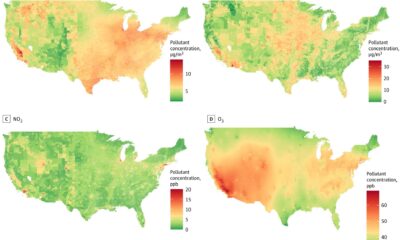Health
New research confirms that community pharmacies can help people quit smoking

Credit: Unsplash/CC0 public domain
A new study shows that community pharmacies can play a key role in helping people quit smoking. The findings emerged in the article “Closing the Tobacco Treatment Gap”, published in the special issue celebrating the 10th anniversary of Pharmacy. The results provide valuable insights into the implementation of smoking cessation services within community pharmacies while identifying barriers to further improvements.
Tobacco use remains a major preventable cause of death. Although two-thirds of people who smoke would like to quit, many people who try to quit on their own are unsuccessful. To close this gap, the study explored how pharmacists and pharmacy technicians can help provide smoking cessation support.
Led by researchers from the UC Davis Comprehensive Cancer Center and other academic institutions across the country, the study involved seven independent community pharmacies in California affiliated with the Community Pharmacy Enhanced Services Network. A total of 22 California pharmacists and 26 pharmacy technicians who had completed smoking cessation training participated.
“Community pharmacies are important partners in expanding access to smoking cessation services,” said Elisa Tong, a UC Davis Health internist and director of the cancer center’s Tobacco Cessation Policy Research Center. “State law allows pharmacists to dispense all forms of nicotine replacement therapy (NRT) without a prescription from the provider.”
The California law allowing pharmacists to offer the cessation tool went into effect in 2014. Eligible pharmacists must complete two hours of tobacco training and follow the state-approved protocol, which includes assessing patients’ current tobacco use and previous quit attempts, and screening for NRT appropriateness, providing medication counseling, and addressing or referring patients for behavioral therapy. Smoking cessation has been integrated into the curricula of California pharmacy schools since 2000, and many other training programs are available for pharmacists.
“After completing tobacco treatment training, our study showed that pharmacies successfully quit smoking,” said the study’s senior author, Karen Hudmon of Purdue University College of Pharmacy. “Compatibility with existing workflows, staffing and the critical role of pharmacy technicians have helped significantly.”
There are ongoing research efforts underway to study policy implementation strategies, especially for pharmacist reimbursement. California law allows Medi-Cal and private insurance to pay pharmacies for enhanced services, including education and medication management.
“Pharmacists and pharmacy technicians play a critical role in providing effective support for tobacco treatment and other related health issues,” said Robin Corelli, a UC San Francisco pharmacy faculty member and co-author of the study. “Being part of the local community is important and we need sustainable models to deliver these services.”
By removing barriers, pharmacies can reach more people
Given that 89% of Americans live within five miles of a community pharmacy, these can be convenient locations for receiving healthcare services. Pharmacists have shown to be effective in helping patients quit. They can reach under-resourced uninsured patients, as well as patients living in rural areas who may face barriers to accessing primary care. However, the research shows that certain barriers exist that prevent pharmacy cessation programs from being effective.
The study found that billing complexity, software limitations and gaps in training for handling complicated patient cases all pose challenges to the successful implementation of smoking cessation services at pharmacies.
However, the data collected implied a progressive healthcare model in which pharmacists and their staff can play a fundamental and dynamic role in local health management and ultimately in cultivating a healthier population. The study serves as a valuable resource for policymakers, healthcare professionals and stakeholders in public health efforts to combat tobacco use.
More information:
Katy Ellis Hilts et al., Closing the Tobacco Treatment Gap: A Qualitative Study of the Implementation of Smoking Cessation Services in Community Pharmacies, Pharmacy (2024). DOI: 10.3390/apotheek12020059
Quote: New research confirms community pharmacies can help people quit smoking (2024, April 19), retrieved April 19, 2024 from https://medicalxpress.com/news/2024-04-community-pharmacies-people.html
This document is copyrighted. Except for fair dealing purposes for the purpose of private study or research, no part may be reproduced without written permission. The content is provided for informational purposes only.













